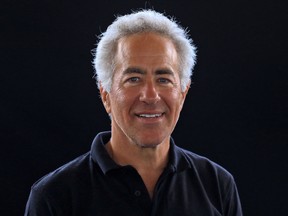Nearly $25 million will be set aside for the construction of the Sylvan Adams Sports Science Institute and the purchase of equipment. The other $4.6 million will go to grants, conferences, scholarships and exchanges.

.
It is an exciting time for McGill University.
Announcement 2
.
Just a week after it was announced that the school would receive architect Moshe Safdie’s archives and Habitat 67 apartment, McGill’s faculty of education will receive what it says is the largest donation ever given to such a faculty in Canada.
.
Quebec-born businessman Sylvan Adams will donate $29 million to the college’s department of kinesiology and physical education for sports science research, with the goal of improving human performance and promoting healthier living, the university announced. on Wednesday.
Adams previously ran a large real estate development company in Canada and now lives in Israel, where an institute was opened in his name at Tel Aviv University in 2017.
Another center will be established at McGill under the name Sylvan Adams Sports Science Institute, which the university says will feature testing labs, training suites, research offices and meeting rooms in a facility next door to the Montreal Neurological Institute. It will focus mainly on the study of elite athletes.
Announcement 3
.
“This contribution will enable McGill researchers and students to develop new insights in sports science education, research and practice, elevate the performance of Canadian athletes and improve our understanding of human health,” said the director of McGill, Suzanne Fortier, in a statement.
Nearly $25 million will be set aside for facility construction and equipment purchases. The other $4.6 million will go to grants, conferences, scholarships and exchanges.
Henri Lajeunesse, a master’s student in kinesiology at McGill, received one such scholarship and will begin his studies this fall. His project will focus on how different brain regions affect the performance of endurance runners.
Announcement 4
.
“My whole life I thought the brain was just about the most interesting organ there is, and I’ve always been interested in science, I’ve always been interested in sports, and it seemed like a nice fusion of the two. together,” he told the Gazette.
Lajeunesse called the scholarship “a great honor” and Adams’ donation to the school was “really exciting.”
“Sports science is not exactly a field that has been well-funded compared to other scientific fields,” he said. “And I think this institute, both the actual physical institute and the funding that (Adams) is giving us, will give us a head start in sports science to try to… expand our field.”
The professor supervising Lajeunesse’s research agreed.
ad 5
.
“I don’t think I need to overemphasize how excited we are about this amazing gift and the support we’ve been receiving in my lab, in terms of having a grant to advance our sports science research, but also to support students like Henri.” said Caroline Paquette, an associate professor in the department of kinesiology and physical education.
“I am very interested in how the brain controls movement, and having this opportunity to study how the brain can affect performance is very exciting for us,” she said. “The way we can push performance and push the boundaries of performance is very, very exciting.”
For Henri’s research, stimulators will be attached to participants’ heads to induce a current in different parts of the brain in a noninvasive and painless way, Paquette said. That alters brain activity for a short period of time.
ad 6
.
“If we increase excitability or activity in that region, do we have an impact on performance?” she said. “Will that help motivation, for example?”
In a statement, Adams, who in 2015 signed the Giving Pledge to donate most of his wealth to charitable causes, said he is “pleased” to support McGill in his sports science research.
“As a former Montreal resident, I am especially proud to have this opportunity to invest in McGill’s history of research excellence and innovation potential, and to help build a culture of collaboration between McGill and Tel Aviv University,” he said.
Sports scientists from both universities will “focus on human performance during intense training, leveraging their respective complementary research strengths in physiology, biomechanics, motor control, psychology, nutrition and molecular biology,” McGill said in a statement.
ad 7
.
The dean of the McGill faculty of education said the institute will act as a hub for researchers from various fields.
“Working through collaborations, working with different universities and I guess units or institutes around the world is only going to benefit the growth of the field itself… much faster than if they were doing this work alone, isolated from any kind of knowledge that is being shared. be producing. in other places around the world as well,” said Dilson Rassier.
McGill Chancellor John McCall MacBain said in a statement that Adams’ vision “will position McGill as a leader in academic sport scientific research in Canada and internationally, with the resources to optimize performance, recovery and health, not just in the world’s elite athletes.” but in all of us.”
-
Moshe Safdie donates architectural archives, and his Habitat 67 apartment, to McGill
-
‘I feel high,’ says Moshe Safdie of donating archives to McGill
-
Drastic reduction of tuition fees for foreign students in the regions penalizes Montreal: Plante




